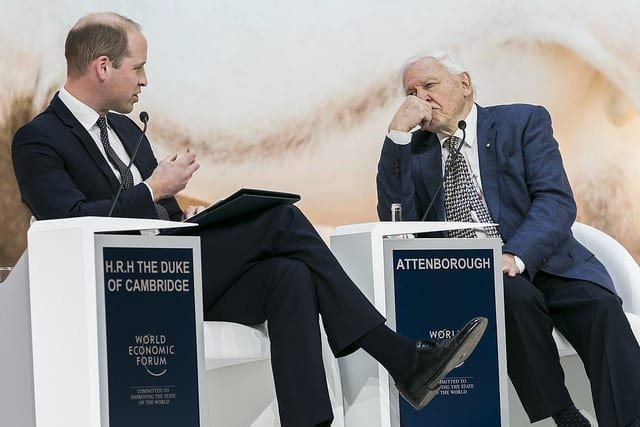Main image credit: World Economic Forum / Benedikt von Loebell
Sir David Attenborough, in conversation with the Duke of Cambridge, has urged political and business leaders to protect the natural world. His call, made at the World Economic Forum (WEF) in Davos on Tuesday (22 January), reinforces the urgent need expressed by campaigners and organisations for a new deal for nature and people in 2020 – an agreement which would aim to halt and reverse the loss of nature and protect our planet.
WWF ambassador Sir David Attenborough joined the Duke of Cambridge in a conversation on-stage at WEF 2019, after Sir David was presented with the WEF Crystal Award on the opening evening.
They discussed Sir David’s decades of work, from his first-ever documentary series 60 years ago to his upcoming Netflix Original Documentary series Our Planet, which will be released on 05 April.
The pair also watched a short clip about the impact of climate change on the Arctic from the series. The ground-breaking, eight-part series –a collaboration between Silverback Films and WWF – will showcase the planet’s most precious species and fragile habitats.
Urgent challenges
Sir David spoke of his lifelong ambition to create societal affinity with the natural world through his work, and the need now for this affinity to translate into real, collective action to protect our planet. The pair discussed the urgent, environmental challenges our generation currently faces, and the opportunities for global leaders and citizens to tackle them – before it’s too late.
Sir David Attenborough said: ‘We have to recognise that every breath of air we take, every mouthful of food we take comes from the natural world. And that if we damage the natural world, we damage ourselves… We have the power. We have the knowledge to actually live in harmony with nature.’
The Duke of Cambridge said: ‘People of my generation are beginning to step into positions of leadership around the world. The work to save the planet is largely going to happen on our watch.’
Sir David Attenborough later took part in a high-level panel discussion entitled ‘Safeguarding Our Planet and launch of Voice for the Planet’, which will be chaired by Al Gore, former Vice-President of the United States.
Other panellists are Anand Mahindra, chairman of the Mahindra Group; Akira Sakano, co-chair of Davos 2019 and Jacinda Ardern, Prime Minister of New Zealand. After the panel discussion, Sir David hosted a special screening of the upcoming Netflix Original documentary series Our Planet.
 Play Video about This Rock Might Just Save The World
Play Video about This Rock Might Just Save The World Play Video about Play 2 hours of rock
Play Video about Play 2 hours of rock Play Video about Play 2 hours of brook
Play Video about Play 2 hours of brook Play Video about Play 2 hours of sheep
Play Video about Play 2 hours of sheep











































